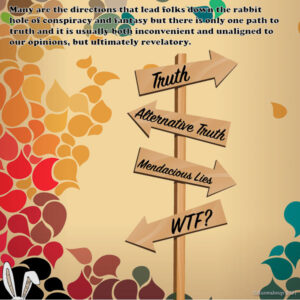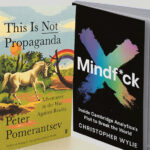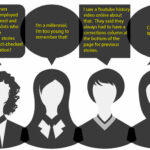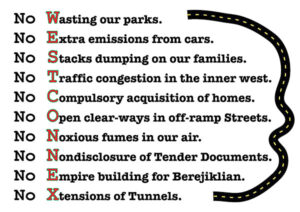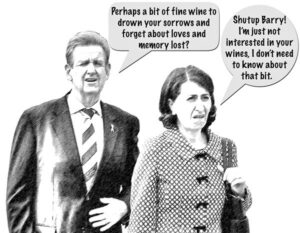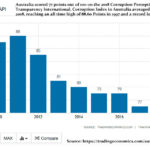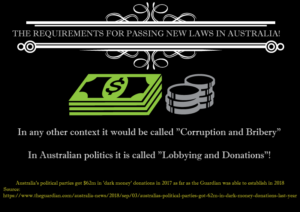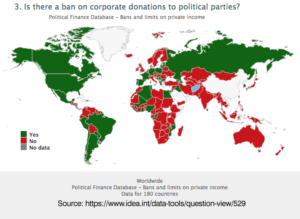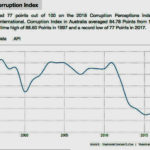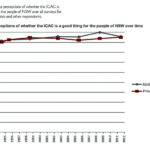Dear Gladys,
Our relationship has curdled, and I am concerned about your mixed messages. Despite maintaining it was finished between us (The voters, not Daryl), you remain in the house. Using our joint account to pay $10,000 a day for your expensive addiction to lawyers. When lovers tell each other it is over, they separate as soon as possible. We have moved on to Dom “Opus Dei” Perrottet. Our heart has changed allegiances; once we realised you were representing Daryl, and not us.
Obviously, we need to rethink this, adding a little candour to how our relationship has transpired. Yes, we (NSW) voted for you in high hopes you would be better for our economy (as you always promise but don’t deliver). You’d think we’d learn that, but like Charlie Brown, we want to hope Lucy isn’t lying to us, and we have another punt at that ball. Your words were beguiling, and we always fell for it. Some friends warned us, but we are all too forgiving in 2019. Just look at how heartbroken we were in 2021 when you said you were leaving us. Then you didn’t leave, toying with our feelings.
Deep down, we know it hasn’t been working well for years. Some of us had misgivings only a year ago. Both Bernard Keane and I expressed our doubts in October last year, three days apart from one another. OK, I admit I was a lot harsher than Bernard, as he seemed to think your most prominent sin was cheating on us with Daryl Maguire. But, even lately, Bernard has not been as tough or honest with you as he should be. Instead, Bernard sugarcoats it as “two remarkable misjudgments” as though they were your only ones, which “until 2020, was a glittering career”.
Are we dating the same woman?

Bernard and I must be “dating” different women named “Gladys”. I don’t want to dwell too long on matters raised before, so I will be quick. I thought we both loved koalas, but instead, others gave you the tag #koalakiller because of your environmental policies on logging forests. You promised me public transport but gave us tragically built ferries not designed for our bridges and Trains not made fit for our tunnels. You said you valued our cousins in the public service. But you spent all our money on pay rises for 65 coalition politicians and a police commissioner and refused to fund public service workers. You said you were good with money, but there were overpayments for some properties and underpayments for others. Was it just empty promises when light rails, stadiums and museums were under-costed or facing undisclosed financial discrepancies?
Your cuts to Rural and Urban fire services and de-staffing fire management officers and National Parkes and Wildlife, all before the most extensive bushfire in NSW. All despite having been predicted a decade earlier. The dodgy water trading, fracking and conservation failures, all while you hid MP’s water interests and were not straight with us. You switched on the desalination plant in Kurnell when water ran out in country towns and Dams were contaminated and then made us pay the subsequent price rises. Westconnex did well, while we saw the prospect of rising toll road costs and lost properties to compulsory acquisition. So, Gladys, you just needed to do a little planning. Then you put our lives at risk via the Ruby Princess and Aged care deaths under the management of Aspen Medical despite the fraud associated with them. But Bernard thinks you made only “two remarkable misjudgments”. Really Bernard, how could you overlook all this? Love, really is blind!
Her “glittering career”!
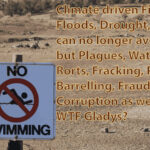
Look, Gladys, I was really hoping we could all move on to “a glittering career”. But the end of 2020 and 2021 hasn’t been covered in glory, have they? Barely had I finished talking about our relationship concerns in October 2020, then the “Stronger Communities Fund” pork-barrelling to coalition local councils showed up. You tried to hide your infidelity by shredding documents relating to those councils’ $252 million grants scheme. Even Scotty from Marketing could have told you that you don’t go on TV and refer to pork barrelling as the “common parlance” and at least try to look a little contrite.
Before the month was out, we discovered you’d previously given Wagga Wagga $40K worth of Grants out of a discretionary fund and to nobody’s surprise, it was Daryl’s electorate. (You’re our representative, not his.) True, the Premier’s fund was at your sole discretion, but you were not very discrete (as ICAC has the tapes). Daryl got millions for projects without business plans or discussions of substance. You seemed to “just throw money at Wagga” to benefit him. In November, the Upper house voted to refer you to ICAC for failing to disclose your relationship with Maguire.
By December, the ABC was reporting your involvement in the project for new headquarters for the Australian Clay Target Association Daryl Maguire championed. You have to admit Gladys he always one with an eye for a profit which ICAC tapes revealed you knew, despite seeking to maintain plausible deniability coyly with, “I don’t need to know about that bit“.
In March 2021, ICAC confirmed they were still investigating Daryl. The highway running past his properties in his electorate came under scrutiny, as did your meeting over it with him. His Airbnb plans for his Ivanhoe properties didn’t strike you as a conflict of interest issue? Really, Gladys, really?
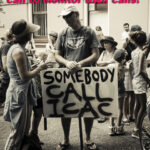
By May, when the upper house voted to provide for ICAC’s $7.2 million budget shortfall due to their declaration that its annual funding had been below inflation for most of the 30 years since its inception, but your friends in the lower house voted it down. It doesn’t help sell the image of integrity for someone for whom “all proper processes were followed” to underfund the very organisation that could establish that. If you have done “nothing wrong”, why undermine the one organisation that could prove it?
Daryl resigned from the party in July of 2018 over those scandals, and despite this entire sordid history, he remained on the crossbench. Does either of you understand the concept of “resignation”? Despite “quitting”, he stayed till August of 2018. Despite that, did it never occur to you to break it off with him and serve your constituents? Why wait till September of 2020 when the further announcement of ICAC investigations transpired?
Meanwhile, Wagga Wagga was doing very well, from their $12m cycling complex to their Australian Clay Target Association. Wagga Wagga seems to be the epicentre of sport in NSW. No surprise that more people in Wagga Wagga voted for the Liberal Candidate than for the Independent that won via preferences. Pork Barrelling works because the public is gullible and shallow.
Corrosive Covid
But enough of corruption charges, let’s look to your handling the pandemic and how you developed your competencies following the early mistakes of the “Ruby Princess”.
By June 2021, our attention moved on, as had yours. Your new beau, Arthur Moses, stepped up, being one of many who offered support. The AMA advised you to lock Sydney down when the Delta Variant made its way to Sydney. But you didn’t take the help they prescribed and relied on “business advice” for matters related to a virulent disease that had killed millions in India by June. Your own report coinciding with the Bondi cluster starting June 16 mentions “business” 21 times and “health” three times. Although “businesses” were still upset! You knew what happened when Dan delayed locking down the first time, yet you waited for School holidays to start a soft lockdown? Afterwards, you listened to medical advice. Who suggested that was a great idea, given you locked down the Northern Beaches during the previous Christmas over similar numbers? You waited another four weeks after the school holidays to get serious about a lockdown for what reason? How did this demonstrate your competence? Indeed, the 408 people who died from the virus before you resigned will never know.
So our infection rate rose over 1500 a day, Nurses and Doctors ran themselves ragged, and even though Morrison offered you the lion’s share of vaccines, NSW struggled to serve communities from the beginning.
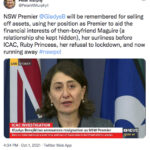
The other Eastern States provided their resources for contact tracing because you weren’t coping independently, but the public was told your State was the “Gold Standard”. You even needed help from the military to enforce lockdowns. Still, some people believed you were better than a Premier that had to break his back before he stopped doing public briefings. Whereas you stopped doing so because you needed time to run the State? To do what exactly? To open up around August/October when we still had hundreds of cases which seems a little contrary to the idea you expressed that “the number of positive coronavirus cases infectious in the community must drop to “as close to zero as possible” for the shutdown to be lifted”. But, of course, our new Premier, Dominic Perrottet, disagreed with that as a policy as the State recorded 477 new COVID-19 infections and six deaths on the weekend before restrictions were eased the following Monday. That was October 11, and you had resigned nearly two weeks before but were (and are, as of writing this) still a fully paid member of Parliament.
When are you leaving us?
So now I am writing the letter we should have written earlier if only we’d had the gumption and realised just how dysfunctional this relationship was. Instead, the media and public mourned your departure like it was a Shakespearian tragedy. I have never witnessed so significant a case of Stockholm Syndrome. Like the victimised battered wife who excused everything he did, outsiders are left wondering, why we didn’t leave long ago? All the indicators were there even from a year ago, yet too few remembered or noted.
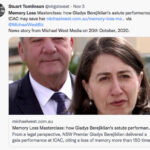
But you are still in Parliament, you are still charging the State taxpayer for your legal fees, and you haven’t left yet. As a result, most days lately, we hear about your memory loss, despite a previous reputation for maintaining a detailed memory with “meticulous focus on every minor policy detail “.
You said you were going, Gladys. Put the money back you have taken from the State coffers and leave! There is only so much corruption, pork barrelling and taking advantage of us that we can stomach.
Curiously wondering for how much longer before you pick up your toothbrush and go!
Regretfully,
The NSW Public.
